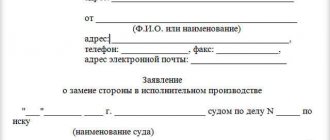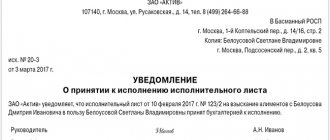There are not many ways to escape from fulfilling debt obligations: change some personal information, move and change jobs, get rid of property in time before it is seized. But bailiffs also have their own search system.
Searching for the debtor's property in enforcement proceedings is, of course, not a fully streamlined process, but nonetheless successful. In the future, recorded facts of ownership of any property become guarantors of debt payment.
When they put you on the wanted list
The grounds for putting the debtor and his property on the wanted list are Art. 65 Federal Law No. 229, which contains an exhaustive list of situations in enforcement proceedings in which the bailiff begins work. The article outlines the mechanism of action and terms of reference of the FSSP employee.
There are three reasons for the announcement:
- at the initiative of the applicant;
- on the bailiff’s own initiative;
- according to court enforcement documents (writ of execution or court order).
The article focuses on the search for a child who may be within the Russian Federation or illegally detained on Russian territory. In these cases, bailiffs are guided by international agreements on the provision of legal assistance between the Russian Federation and foreign countries, but they are often not enforced due to political disagreements between states.
Bailiffs can put on the wanted list
The tactics for carrying out executive search actions are determined by the chief bailiff of the Russian Federation.
10.1. The bailiff carrying out the search has the right to apply enforcement measures in accordance with Part 7 of this article, as well as in urgent cases provided for by Part 3 of Article 35 of this Federal Law.
11. To carry out a search, the bailiff carrying out the search, at the request of the claimant, has the right to use information obtained as a result of private detective (detective) activities, and to carry out the search for a debtor-citizen or a child, also use the capabilities of the media free of charge.
11.1. Detection of the debtor during investigative activities After discovering the defaulter, the bailiff has the opportunity to personally warn him about the obligation to pay the alimony debt and current payments in favor of the child (children), and in case of failure to comply with the established requirement, apply further enforcement measures:
- administrative: foreclosure on property and funds;
- compulsory work;
- administrative arrest;
- correctional work;
However, it must be taken into account that the practice of applying criminal sanctions against alimony debtors under Art. 157 of the Criminal Code of the Russian Federation is not wide, and preference is always given to administrative prejudice - i.e. Bank employees do not run after debtors on their own. The bank can also sue the debtor and then lawyers and bailiffs deal with this matter, with a court order in hand. If the loan was taken according to all the rules, without the fact of forgery of documents and pre-planned malicious intent, then they cannot. This is a problem for the bank, and it has the opportunity to resolve issues through the court, or transfer debt obligations to collectors, which is what happens in Ukraine. Which of these two evils is the lesser is even difficult to understand. The excesses that collection agencies allow themselves openly border on crime, but there is no legal authority over them. So, in our country, it’s better not to take out loans. They are wanted for serious criminal offences. Failure to repay a loan is, although de facto fraud, but not a de jure crime.
How does the search work?
Declaring a search is a procedural action with a formal time frame for making a decision - 3 days in relation to property or establishing the location of the debtor and 1 day - to begin the search for a child. The same deadlines apply to refusal to carry out investigative actions.
To identify the debtor, bailiffs use the powers granted to:
- collecting information about the wanted person (for this, operational databases and personal data storage facilities are used);
- the right to interview relatives of friends and colleagues at the place of work;
- check documents in order to identify the wanted person;
- inspect areas of the area, premises, structures (they do not have the right to freely enter residential premises, without being accompanied by police officers and witnesses);
- inspection of debtors' vehicles.
In order to establish property, bailiffs can:
- send requests to the place of registration of movable and immovable property (Unified State Register of Legal Entities, Unified State Register, registration department of the State Traffic Safety Inspectorate, to credit institutions);
- inspect things belonging to the debtor to determine the liquidity of the debt;
- seize prior to the sale auction;
- place movable property or farm animals in temporary storage (holding).
Actions of the bailiff to search for the debtor's property
Hotline for citizen consultations: 8-804-333-70-30
Property search
Searching for the debtor’s valuable property is an effective measure that helps to bring to justice a debtor who is evading the fulfillment of his obligations, hiding, or not communicating. In accordance with current legislation, if there is a court decision, the debtor is obliged to voluntarily provide information about the presence of valuable property and bank accounts. In practice, creditors often face the fact that the debtor hides this data.
How to search for the debtor's property
- By law, the search for valuable property of the debtor is required to be carried out by representatives of the bailiff service, sending requests to various departments that keep records of this or that type of property.
- Also, the search can be carried out by the creditor on his own. Most often, this method works in relation to bank accounts; information about the presence of movable, immovable or other valuable property can be difficult to obtain. If we talk about searching for accounts, banking organizations are required to provide such information upon presentation of a writ of execution from bailiffs. In the same way, you can obtain information about the availability of accounts with the tax service. by sending a written request and providing a writ of execution;
- The most convenient and fastest way to search for property is to turn to professionals. With the help of their sources, such organizations search for movable, immovable and other property of material value, as well as bank accounts. Based on the search results, the customer is provided with a detailed report on the property owned by the individual of interest. This report can be used in court proceedings as evidence of the debtor's property and bank accounts.
Valuable property of interest in the search includes:
- Real estate (houses, apartments, cottages, country houses, etc.), as well as ownership shares in them;
- Vehicles (trucks and cars, boats, yachts, boats, etc.)
- Valuable items (expensive jewelry, antiques, exclusive pieces of furniture, collectibles, etc.)
USEFUL INFORMATION: Recognition of the fact of incapacity of a person through the court
The search is also carried out in relation to the debtor's bank accounts. If there is a corresponding resolution, it is possible to suspend operations on the debtor’s accounts
What is the difference between searching for a debtor and searching for his property?
The difference between searching for a debtor and searching for property is subjectivity. In the first case, the subject is a specific individual. In the second, there may be several subjects: movable/immovable property, currency, non-monetary assets (copyrights, patents, certificates).
The identification of a person is carried out using the police department database, in which those living in the territory of the Russian Federation are registered.
Property - can have many sources of formation, so the search is difficult. Assets are split up, transferred abroad, transferred for “storage” to third parties, or registered in the name of nominees. Not all property is subject to seizure and sale if discovered. Even when it is established where the property is located, it is sometimes impossible to satisfy the claims of creditors due to restrictions imposed by law.
Methods for a creditor to find a debtor
- Initially, it should be noted that the choice of the method of searching for the debtor is made by the creditor independently, based on the specific circumstances of the case and its capabilities.
- Independent search for the debtor . When carrying out a search, the creditor can involve other persons, contact bailiffs or competent organizations.
It should be noted that this attraction is usually not done officially, i.e. the relationship between the parties involved in the search is not documented. It is important to remember that all individuals and organizations involved in the case do not have any restrictions that could interfere with their work. The search is carried out at the voluntary request of organizations and the creditor. Another advantage of this method of searching for a debtor is its cost-effectiveness. It should also be noted that with this procedure, the identification process is not necessary, since the parties are familiar.
As a result of this activity, the creditor must use the method permitted by law. Along with many advantages, this method also has a huge disadvantage. They are limitations in capabilities. For example, a creditor does not have the right to obtain information about the debtor’s personal bank account. Thus, this method is used when the debtor is not hiding from the creditor or was found completely by accident.
Making a statement
An application to initiate a search can be submitted to the bailiff by the creditor (collector). Without touching on the nuances of searching for a child whose location was caused by the unlawful actions of one of the parents or relatives, we will focus on the procedure for searching for a person and property.
Filing an application to search for the debtor and property is not difficult. We recommend using the forms posted on the websites of regional FSSP departments or templates on legal websites on the Internet. An example of such a statement can be a SAMPLE posted on the website of the Federal Bailiff Service of the 74th region of the Russian Federation.
The application is submitted to the bailiff in whose proceedings the enforcement documents are located. If the location of the debtor is not known, the following sequence is followed:
The procedure for searching for a hiding subject
How to find a debtor by address or last name
The law provides creditors with the opportunity to obtain a court order in the absence of the defendant. In order for the proceedings to begin, it is necessary to draw up a statement of claim to collect the amount of debt from the citizen and send it to the court (if the amount of claims is less than 50 thousand rubles - to the world court, if more - to the district court).
You can independently find a hiding debtor using the Internet and through his close relatives, but it is important to understand that the creditor should not cross the permitted boundaries of communication. The best way out of the situation is to contact law enforcement agencies
What documents does the bailiff need?
To initiate a search for the debtor, the collector attaches to the application a document confirming the right to collect. To facilitate the activity and speed up the search process, you can provide the bailiff with information about:
- permanent or temporary registration of the wanted person;
- place of work;
- location of property;
- motor transport (state registration number);
- bank accounts;
- the presence of relatives who own real estate that does not correspond to their income level.
Bailiffs cannot find the seized car
And if the debtor has nothing to pay, he does not have official income, bank accounts, then the bailiffs have the right to describe his property. That is, you know that the matter smells of litigation and immediately, without delay, re-register the property to other persons, or sell it or donate it , anything, but so that by the time enforcement proceedings are initiated against you, you do not have property that can be foreclosed on by law, in this case, if it is a car, then you sell your car, or transfer it to relatives (mother, dad, brothers or sisters). Full name of the persons who were present when the car was seized; information about seized property; data from documents that confirm the existence of property rights; a preliminary estimate of the value of the thing or property right included in the deed, and the total value of the seized property are entered;
How bailiffs find out the debtor’s place of work
If a person is officially employed and the employer makes established contributions to the Pension Fund and the Compulsory Medical Insurance Fund for the employee, then the bailiffs look for debtors through the databases of these funds to determine which institution (enterprise, individual entrepreneur) is the payer. Thereby establishing the place of work and position of the hiding person.
If the work is illegal, or the debtor is a freelancer (self-employed), you can check the sources of income based on indirect data:
- contacts in social groups;
- analysis of information contained in the phone (computer);
- analysis of cash receipts to the bank accounts of the wanted person, coming from various payers;
- carrying out the search activities mentioned above.
How to lift a wanted list from bailiffs and is it possible to fly to other Russian cities while on a wanted list?
Good afternoon I have outstanding debt in the amount of more than 1 million rubles. I have never communicated with the bailiffs, I have no property and no official income. I do not live at my place of registration. Through friends in the authorities, I learned that I was on the Federal wanted list. Tell me, can I fly by plane to other cities of the Russian Federation? And also, is it possible to cancel this search if I contact the bailiffs and does this threaten me with any consequences?
Lawyers' answers (1)
If you are put on the federal wanted list, then a watch list will be issued for you, respectively, when purchasing an air or railway. If you receive a ticket, information about you will be identified and you will be detained and handed over to the initiator of the search. In order for the search to be lifted from you, you need to appear before the bailiff and indicate your location, and then enforcement actions will be taken against you; if you have nothing, then there will be no special consequences. Nevertheless, it is worth studying Article 177 of the Criminal Code.
Criminal Code of the Russian Federation, Article 177. Malicious evasion of repayment of accounts payable
Malicious evasion by the head of an organization or a citizen from repaying accounts payable on a large scale or from paying for securities after the relevant judicial act has entered into legal force - is punishable by a fine in the amount of up to two hundred thousand rubles or in the amount of the wages or other income of the convicted person for a period of up to eighteen months, or compulsory labor for a term of up to four hundred eighty hours, or forced labor for a term of up to two years, or arrest for a term of up to six months, or imprisonment for a term of up to two years.
Note. In the articles of this chapter, with the exception of Article 169, parts three - six of Article 171.1, articles 171.2, 174, 174.1, 178, 180, 185 - 185.4, 185.6, 191.1, 193, 193.1, 194, 198 - 199.1, 200.1, 200. 2 and 200.3, large-scale, large-scale damage, income or debt on a large scale is recognized as cost, damage, income or debt in an amount exceeding two million two hundred and fifty thousand rubles, and especially large - nine million rubles.
Debtor found, what next?
When establishing the location of the debtor, the bailiff has the right to enforce the court decision. For these purposes the following is produced:
- sending a writ of execution to the place of work to withhold amounts to repay the debt;
- bank accounts are seized;
- property is seized and sold to pay off the debt;
- an administrative restriction on travel outside the Russian Federation is introduced;
- in case of obstruction of the bailiff's activities, he has the right to deliver the wanted person to the nearest FSSP office.
After establishing the location, the bailiff is obliged to cancel the search order within 3 days.
How is the search carried out?
This document is approved by the senior bailiff and transferred to the internal affairs bodies. Punishment for non-payment of alimony is imposed only after the debtor is found.
In the event that the debtor, within the established time frame, did not fulfill the requirements that are described in the writ of execution, then the bailiff is within the competence of the possibility of issuing a ruling on the temporary restriction of his travel abroad.
In the event that the debtor tries in every possible way to interfere with the legal activities of the bailiff by committing enforcement actions (refusal to provide information about the place of work, place of actual residence), the bailiff can draw up a protocol on the commission of an administrative offense, send it to the court, where a decision will be made on imposition of a fine.
What to do if the debtor is not found
Debtors can hide very skillfully, changing their last and first names, place of residence, region, ignoring registration at their place of residence, working unofficially, driving vehicles by proxy, without traveling outside the Russian Federation. All this, given the rather clumsy FSSP system, makes search efforts ineffective. Many alimony workers have been wanted for years, accumulating thousands of dollars in debt.
If the search does not bring results, you can initiate a search through the Ministry of Internal Affairs, which is effective compared to the work of bailiffs.
How to find out debt from bailiffs
To travel abroad or apply for a loan, you need to prepare certain documents. In addition, it will be useful to clarify issues related to the presence or absence of debts in the bailiffs’ database. In fact, this should be done, since refusal to cross the border or to provide a loan can be an unpleasant event.
Debt verification is not a mandatory procedure, however, it is worth performing it for your own reinsurance. Even if a citizen is not planning a trip abroad, applying for a loan or concluding a major transaction, it is worth keeping abreast of the situation and regularly checking the information to be sure that there are no debts. In addition, you can check your business partner in this way if there is some kind of joint work to be done, in order to make sure of his solvency.
What changed
A very strange addition to Art. 65 Federal Law No. 229 part 16, was implemented in 2021. Removed the burden of responsibility from bailiffs to search for malicious alimony defaulters. Without at all improving the situation of the claimants. According to paragraph 16 of Art. 65 Federal Law 229, if during the year the enforcement search did not lead to the establishment of the location, the bailiff simply informs the claimant about this. Thus, he shifts the problems to the initiator of the search, proposing that the debtor be recognized as missing in court.
What benefit does a person who does not receive alimony receive from this, the legislator is silent...
FAQ
I received a letter from the bailiffs that the court foreclosure on the loan was cancelled, can the bailiff subsequently resume proceedings again?
Check on the FSSP website for what reason the enforcement proceedings were completed or terminated. If you have not repaid this debt, then most likely it will be under Art. 46 part 1 clause 3. - return of the writ of execution to the claimant. If the claimant returns the sheet back to the bailiff, the proceedings will be restored. Ask a question that interests you - use the online consultant form on the right or call (Toll-free hotline). It's fast and free!
Can the bank itself present a writ of execution to the accounting department of the organization where I work?
The claimant has the right to present a writ of execution to the bailiff, to the bank where the debtor's accounts are opened, or to the employer's accounting department if the debtor is an individual. Ask a question that interests you - use the online consultant form on the right or call (Toll-free hotline). It's fast and free!
According to the writ of execution, 50% of the salary was withheld, but I did not know that the bank had filed a lawsuit. What can be done in such a situation?
If the amount of debt does not exceed 500 thousand rubles, then most likely the court issued a court order. It is necessary to go to court to cancel the court order and obtain an appropriate determination, which will be the basis for terminating the individual entrepreneur. But after the court order is canceled, the bank has the right to go to court to collect the debt. Your right to be present at this process and request a reduction in the penalty. Ask a question that interests you - use the online consultant form on the right or call (Toll-free hotline). It's fast and free!
Why do they start looking?
When it is unknown where the defendant is, the procedure begins to search for debtors by bailiffs. Article 65 of Federal Law 229 explains the following situations:
- Evasion of loan obligations.
- Child support is not paid.
- No compensation is paid for damage caused to the plaintiff’s health or property.
- Compensation for the loss of a breadwinner is not paid due to the debtor.
The FSSP begins the search for debtors from their last place of residence. But if this data is also missing, the search is declared nationwide or even international.
Where to complain if a person does not agree with the bailiff or there were violations on his part?
Often a citizen does not even suspect that he is a wanted debtor. He went on a long business trip, was forced to move in with relatives, or found a job with a large income. And after some time he finds out that they are looking for him.
There are situations when bailiffs seize the belongings of a stranger - the namesake of the real defaulter. Quite often there are also cases when, under the guise of an inspection, everything is taken out of an apartment, and the bailiffs or the debt collector do not hesitate to rummage through the bed linen and look into the trash cans in search of hidden treasures.
If the debtor believes that he is fulfilling his obligations, or he has certain agreements with the collector on granting a deferment, on postponing payments to a later time, he remains to appeal the actions of the bailiff to higher authorities. The application is submitted to the court, the prosecutor's office or the head of the bailiff who is involved in the search. It is advisable to involve all authorities to get the desired answer. The same should be done if the collecting party violates the rights of the debtor. To get the maximum effect, you should contact a lawyer.
To obtain a claim form
with a complaint against the bailiff, take a short survey.
Using the services of a private detective when searching for a debtor
This method also has both a large number of pros and cons. In this situation, when searching for a debtor, the creditor turns to the services of organizations that have the appropriate license to search for tax evaders. Most often, these organizations search for individuals who evade loan repayments.
It should be noted that these organizations can search for a debtor only if the creditor has papers confirming that another person has a debt.
Most often, these documents are a loan agreement, an invoice, or a written receipt.
It is also important to note that private investigators have a greater number of permitted search methods compared to a private individual.
For example, detectives from private organizations can interview the public or employees at work, review personal accounts and other things related to the search. In addition, they can listen to audio and video materials and even the debtor’s phone.
It is important to know that all the work of private detectives is fixed by current legislation.
For example, when conducting a survey of the population, it is necessary to have a written agreement from each person to conduct the survey. It is also necessary to take into account the principle of privacy and protection of personal information during the survey.
Administrative and criminal liability for non-payment of alimony
To influence the defaulter, both administrative and criminal prosecution measures are used.
Thus, the debtor may be deprived of the right to drive a vehicle and a fine may be imposed on him.
As for criminal sanctions, the consequences will be more severe.
For example, if a debtor does not pay alimony for more than a year, he may be arrested, detained, or sent to forced labor.
It is worth understanding that criminal prosecution can only be carried out by a court, based on a preliminary decision to initiate a criminal case by a bailiff.
The procedure for conducting an executive search
The grounds for introducing a search will appear when the bailiff initiates proceedings and carries out initial actions. To initiate a case, the bailiff needs to receive the claimant’s application, and then the writ of execution itself. Also, the claimant may ask the court to transfer documents to the FSSP after they enter into force.
Initiation of proceedings
The FSSP employee is obliged to make a decision on the documents received from the claimant within 3 days. If there are no grounds for opening proceedings, the applicant is informed about this. Naturally, in this case the debtor is not in danger of being wanted.
If the documents comply with the norms of Law No. 229-FZ, then the bailiff is obliged to:
- initiate enforcement proceedings;
- draw up a resolution, enter information into the Data Bank on the FSSP portal;
- send a copy of the decision to the parties.
At this stage, search activities have not yet been carried out. The general information about the defaulter specified in the creditor’s application and the writ of execution will be included in the resolution by the FSSP employee. The actual location verification and property identification will begin later.
Checking information about the debtor and property
A bailiff can collect debts or fulfill another requirement by a court decision only in interaction with the defendant (debtor). After opening a case, the bailiff carries out the following activities:
- makes a request to the Ministry of Internal Affairs about the place of registration of the defaulter (the request is made at the address indicated in the writ of execution or court order);
- requests information from the Unified State Register of Real Estate, the traffic police database on the presence or absence of real estate and vehicles;
- goes to the place of residence of the defaulter, checks the availability of property, draws up an inventory (act);
- seizes assets and transfers them for safekeeping to the debtor or another person.
At this stage, the bailiff may find out that the defaulter does not actually live at his registered address, and understand that his whereabouts are unknown. This will be the basis for introducing a search, but not for property, but specifically for the debtor himself, if the actions of the bailiff did not help to find the real address.
A FSSP specialist will search for property in the following cases:
- if there is no information about the whereabouts of the debtor;
- if, as a result of inquiries, during an inspection of a residential or other premises, no assets were found that could be sold;
- if the value of the identified property is not enough to pay off all debts;
- if the bailiff has not discovered the thing or object that he is obliged to seize and transfer to the recoverer by court decision. For example, the debtor goes through the registration database as the owner of a car, but the bailiff cannot find this car.
In practice, the search for property by bailiffs may not be carried out if the debtor has a stable job and a constant source of income from which he can pay off the debt.
It is much easier to seize the property that was immediately found during a home inspection and send documents for retention to work. Since the collector is interested in collecting the debt as quickly as possible, he can demand a search if he has information about other property of the defaulter.
Search warrant
The search for a debtor in enforcement proceedings or his assets can be carried out at the initiative of the FSSP or at the request of a creditor. According to Art. 65 of Law No. 229-FZ, the obligation to initiate search activities arises:
- if the debt exceeds 10 thousand rubles, and this debt is awarded to the state or municipality (for example, these may be administrative fines);
- if we are talking about non-payment of alimony (the amount of the claim in this case does not matter);
- if compensation is sought for damage to life or health, damage from crimes;
- if the debtor was sentenced to compulsory labor or imposed a fine for committing a crime.
If the bailiff does not take the initiative and does not initiate a search for the listed reasons, the collector may demand this. To do this, an application is submitted, which the FSSP considers within 10 days. If the bailiff unreasonably refused to search or ignored the requests of the claimant, you can file a complaint.
The bailiff himself decides to what extent to declare a search. He can search only for the defaulter, or only for his property, or use both options at once. For example, to collect current alimony payments, you need to find the payer and his place of work. If the debtor has no income, information about his accounts and assets is needed to begin repaying the debt.
Ekaterina Uryvaeva
Bankruptcy Lawyer for Individuals
The law lists several situations when the bailiff has the right to start a search:
- if it is impossible to enforce a decision with non-property claims without personal presence (for example, if the defendant must prepare and post a public refutation after a court decision on libel);
- if the debt exceeds 10 thousand rubles, and the claim is of a property nature.
In fact, this allows you to start a search for any requirements if their total amount is above 10 thousand rubles. If the bailiff himself does not decide to start a search, the creditor has the right to submit such an application.
Let us note once again that in these situations the FSSP officer has the right, and not the obligation, to conduct a search. If the bailiff does not see the need for this, he may refuse the claimant. An appeal will help to finally resolve this issue.
The search for debtors by bailiffs is announced by decree. It states:
- general information about the defaulter known at the time the resolution was issued;
- production number, the essence of the claimant’s demands;
- the period for which the search is announced;
- list of events (later it may be supplemented);
- a list of instructions that will be sent to the services of the FSSP and the Ministry of Internal Affairs.
The resolution is approved by the senior bailiff of the FSSP department. After this, a copy of the document is sent to the parties. If the real location of the defaulter is unknown, the document will be sent to the last known address.
Carrying out search activities
Search activities can be carried out by the bailiff himself, as well as by employees of other departments, if they are given such instructions. For example, according to a search warrant, bailiffs can give instructions to specialists from the FSSP and the Ministry of Internal Affairs in other regions other than where the case is taking place.
To search for property, the following activities can be carried out:
- requests to any public and private structures, databases;
- surveys of persons who may have information about the defaulter and his property;
- working with personal data;
- checking citizens' identity documents;
- inquiry;
- surveys of sites, real estate objects;
- inspection of property (real estate, transport, other movable property);
- personal identification;
- operational-search actions with the involvement of employees of the Ministry of Internal Affairs.
The list of actions that will be carried out to find the defaulter depends on the conscientiousness of the bailiff. Therefore, the claimant has the right to get acquainted with the progress of the proceedings and file complaints if the FSSP is inactive.
The law allows the claimant to submit documents and information that may help in the search. This may also be materials obtained during private detective activities. If the bailiff refuses to accept documents and information without substantiating the reasons, the claimant has the right to file a complaint.
What threatens the debtor
If the debtor deliberately tries to escape and hides property, he may face criminal or administrative liability.
For example, for deliberate evasion of debt repayment, a punishment may be imposed under Art. 177 of the Criminal Code of the Russian Federation. In this case, the amount of debt must exceed 2 million 250 thousand rubles.
For evasion of alimony payments, liability arises according to special provisions of the law. If there is a delay of at least 2 months, the violator will first be held accountable under the Code of Administrative Offenses of the Russian Federation. If he continues to evade payments, a criminal case may be opened in another 2 months.
If the defaulter learned about the claims of the FSSP and the creditor only during the search, he can avoid liability. To do this, you must provide information about your address and other data. After this, the bailiff will begin enforcement actions as usual.
What happens if or when the property is found?
As soon as the property is identified, the bailiff will be able to seize it and begin selling it. The search materials must clearly confirm that the found things, objects and objects belong to the defaulter personally. Seizure can be placed on any assets.
Sales will be carried out through a specialized organization or at auction. In Art. 446 of the Code of Civil Procedure of the Russian Federation there is a list of objects and things that cannot be sold. If an FSSP employee includes assets from this list in the inventory for sale, the debtor will be able to file a complaint.
After the sale, the proceeds will be used to pay the claimant and repay the enforcement fee. The debtor also pays the costs incurred during the search.
Remember that it is very dangerous to keep funds in bank accounts if enforcement proceedings have been initiated against you. There are no banks in Russia that ignore requests from bailiffs. Keep in mind the fact that creditors may also have information about where you keep your money. After all, you yourself often inform about the presence of accounts and deposits in banks in your loan application.
What threatens the debtor if the bailiffs do not find the property?
If the debtor has nothing to pay, and the search for property does not yield results, the following consequences occur:
- the bailiff has the right to extend search activities if there is such a need;
- if execution is impossible due to lack of property, the FSSP officer will complete the proceedings and send a resolution to the parties;
- If the alimony defaulter is not found within a year, the bailiff is obliged to notify the collector of the possibility of recognizing the debtor as missing (this gives the right to receive a survivor's pension).
If the defaulter's financial situation subsequently changes, the proceedings may be resumed. This can be done by the bailiff himself, or the claimant has the right to submit an application.
Termination of proceedings due to lack of property may be beneficial for the debtor. He will be able to apply to the MFC and go through out-of-court bankruptcy. You can check the fact that the case was completed due to the lack of property from the resolution, upon request to the FSSP, through the Data Bank on the bailiffs website. You can learn more about bankruptcy from our lawyers.









